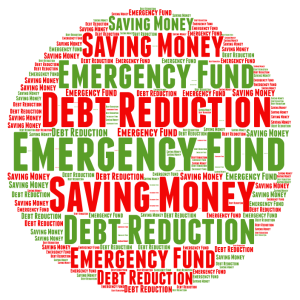I recently wrote about our debt reduction process – a simple one-page guide to getting out of debt.
Over the next few days, I plan to elaborate on each of the steps mentioned in the article, starting today with a few notes about step 1 – and the emergency fund.
My wife and I have our primary checking account with our local bank. This allows us to deposit our paychecks locally – and is a great place for my son to find coins for his collection. The account is interest bearing and is free.
Our saving account is online – and that’s where we keep our emergency fund. Withdrawals from our checking account and deposits into our savings account take place each week, easily initiated from our online bank account. We can easily track our account balances via our online bank’s phone app.
 When getting out of debt – before we started aggressively paying off our debt – we worked hard to fund our beginner’s emergency fund. Our goal was to keep a minimum of $1000 in the account, at all times. We managed to keep between $800 and $2000 throughout our process.
When getting out of debt – before we started aggressively paying off our debt – we worked hard to fund our beginner’s emergency fund. Our goal was to keep a minimum of $1000 in the account, at all times. We managed to keep between $800 and $2000 throughout our process.
The emergency fund helped us cover unplanned-for expenses – and helped us avoid adding to our credit card balances. We dipped into the emergency fund, if memory serves, twice during our debt reduction process.
Both times, we paused our debt reduction (while still making minimum payments, obviously) and rebuilt our emergency fund. Cash reserves were (and are) that important to us!
After getting out of debt – and prior to the purchase of our first home – we worked to save six-month’s worth of salary in our emergency fund. We used the same “method” for savings as we did for debt reduction – but this time – the “extra payments” were going into our savings account.
When we purchased our home, we used a small portion of our emergency fund to help with our down payment. We did this to avoid PMI. After purchasing our home, we rebuilt our emergency fund.
Over time, as we have gotten better at living on a budget and understanding our month-to-month financial needs, we have moved away from a strict “emergency fund” – and more towards categorized “cash reserves”. In other words, our cash is allocated, on paper, for future purchases and long-term goals, plus emergencies.
Our emergency fund provided a lot of comfort during our debt reduction process – and continues to help us as we work towards total financial independence. Thanks for reading – and have a blessed day!